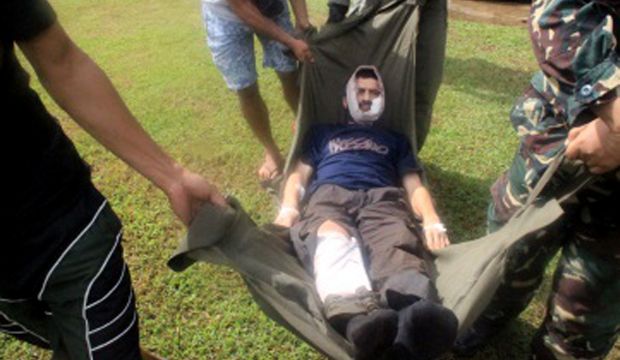
Swiss man Lorenzo Vinciguerra is carried by soldiers, following his rescue, to a military hospital on the southern island of Jolo, Philippines, on December 6, 2014. (AFP Photo/Wesmincom)
Manila, AP—A Swiss hostage made a dramatic escape Saturday from Abu Sayyaf extremists when he hacked a rebel commander then got shot as he dashed to freedom amid a military artillery assault, ending more than two years of jungle captivity in the southern Philippines, officials said.
Lorenzo Vinciguerra, 49, made his daring escape while government forces were firing artillery rounds near the jungle forest where he was being held in mountainous Patikul town in Sulu province. He grabbed a long knife, hacked an Abu Sayyaf commander then ran away but was shot and wounded by another militant, security officials said.
Philippine army scout rangers later found him and escorted him to safety.
“He was wounded, but he’s well and recovering in a hospital,” regional military commander Lt. Gen. Rustico Guerrero told The Associated Press by telephone.
In Bern, the Swiss government expressed relief that Vinciguerra had regained his freedom, but regretted that his Dutch companion remained in captivity.
While lying later in a military combat hospital bed, his head wrapped in a bandage, Vinciguerra basked in his hard-won freedom and thanked the military. He said he was happy because he can finally spend Christmas with his family, but worried about his companion, Ewold Horn, who was still in Abu Sayyaf custody in Sulu’s jungles.
Vinciguerra was seized by the militants in nearby Tawi Tawi province in February 2012 while on a bird-watching trip with Horn.
A Filipino guide who was with them had jumped into the sea and escaped while the militants were taking them by boat from Tawi Tawi to Jolo island in Sulu, an impoverished, predominantly Muslim province where the Abu Sayyaf has endured years of US-backed military offensives.
“I talked to him and asked him to join me, but he refused,” he said of Horn, adding that the Dutchman had teeth problems and other ailments.
Vinciguerra said he felt the extremists would treat Horn well and urged the militants to surrender and start a new life.
“My final message to everybody: Put the gun down and come out from the forest,” he told a reporter. “It’s a nice life out here.”
The Abu Sayyaf was founded in the early 1990s on Basilan island, near Jolo. With an unwieldy collective of Islamic preachers and outlaws, it vowed to wage jihad, or holy war, in the predominantly Roman Catholic Philippines, but lost its key leaders early in combat, sending it on a violent path of extremism and criminality.
Washington has listed the Abu Sayyaf as a terrorist group and blames it for deadly attacks on American troops, foreign missionaries, and tourists and civilians in the south.
The Al-Qaeda-inspired group still has an estimated 400 fighters split into about six factions. The mostly armed rural villagers still hold several hostages, including a Malaysian police officer and a Japanese treasure hunter.
Although weakened by battle setbacks, the militants have survived thanks largely to money collected from ransom kidnappings and extortion.
The Philippine military recently launched a new offensive against the militants after they staged a new bout of kidnappings, including the seizing of Chinese tourists in neighboring Malaysia’s Sabah state, which is only hours away by speedboat from the southern Philippines.
Marines and army troops assaulted at least three Sulu jungle encampments of the Abu Sayyaf on Saturday, with artillery and gunfire, including in Patikul, killing an unspecified number of militants, according to the military.
